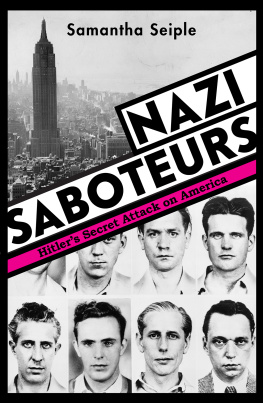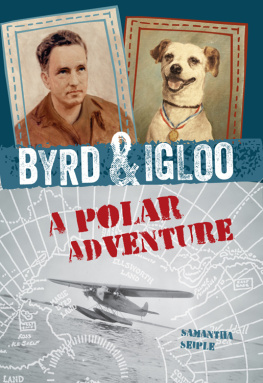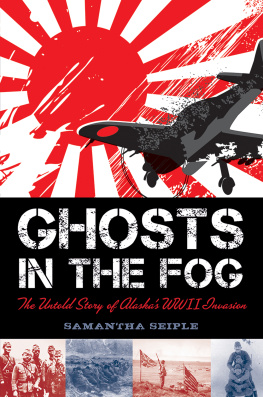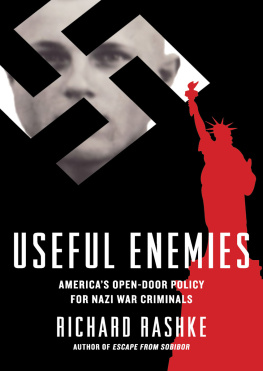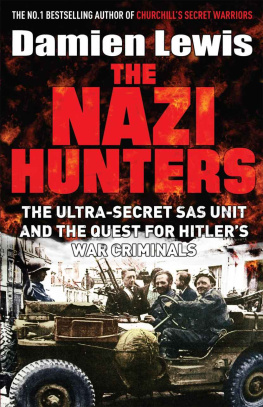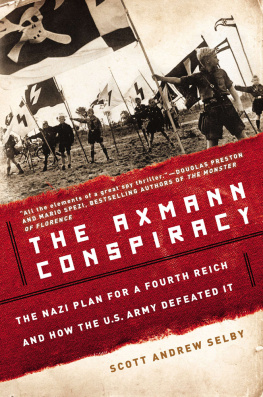
June 13, 1942 (Six months after Adolf Hitler declared war on the United States and one week after the Japanese invaded Alaska)
I t was past midnight in the seaside fishing village of Amagansett, on the East End of Long Island, New York, and a stubborn fog cloaked the towns ribbon of beach. The murky visibility was making it nearly impossible for rookie coast guardsman John Cullen to do his job.
Cullen was a beach pounder, and one of his duties was patrolling the three-mile stretch of desolate shoreline for any suspicious activity. Three weeks before, the U.S. Army had issued a warning of a possible enemy submarine landing. But no one knew when or where it would happen along the 2,000 mile Atlantic coastline between Maine and Florida. So far, every night was always the same. Cullen never saw anyone or anything.
Armed with just a flashlight and flare gun, Cullen continued to walk and patrol the shoreline. The tide was low, and the waves were rolling in and crashing down angrily, sending a thin sheet of foamy salt water over the packed sand. He walked along the waters edge, where it felt like a spongy sidewalk under his feet. After six months on the job, Cullen knew it was inevitable that the sand would creep into his socks despite the canvas gaiters covering his pant legs and shoes.
The thick fog washed over him. The dewy drops clung like lint to his neatly pressed uniform and dripped down his neck from his closely shorn hair. It was so dark and the fog was so thick that he couldnt even see his shiny military-issued shoes. He also couldnt see the German submarine a quarter of a mile away from the shoreline. Or the Nazi saboteurs in a rubber boat filled with explosives bobbing in the water not twenty feet away from him.
Before his job as a sand pounder, Cullen had worked as a deliveryman for Macys department store in New York City. His former employer described him as a thoroughly wholesome, typically American boy with a modest demeanor. Cullen had decided to quit his job to join the Coast Guard after the Japanese bombed Pearl Harbor.
By the time Cullen arrived in Amagansett, Americans had begun to feel the deprivations of war. Dim-out rules had been put into effect, so Cullen saw no lights twinkling anywhere in the misty darkness. At first, people had resisted turning out their lights at sundown, but they were warned that the police would take action, especially against any motorists who drove with their headlights shining like a lighthouse beacon along the coast. The blackout helped protect the U.S. ships that were out at sea, patrolling the coast for any lurking German U-boats.
Despite the recent rationing of sugar, tires, gas, tea, and coffee, a big turnout of visitors was expected in the coastal towns that summer. It was a week before the season would be in full swing, and the golf and surf clubs were getting ready to open. Soon the beach Cullen was patrolling would be crowded with vacationers staking their claims on the sand with colorful towels and umbrellas. With so many summer travelers expected, the Long Island Rail Road had just announced that it was providing additional service for the three-hour train trip from Penn Station in Manhattan to Amagansett.
But tonight, as Cullen walked through the haze, there was no one in sight. He continued to pound the sand. Cullen was about ten minutes into the job and less than a half mile from the Coast Guard station when he was startled to attention. He thought he could see dark objects in the water. He walked a little farther, then clicked on his flashlight. He quickly turned it off. He still couldnt make out what it was, so he walked a little nearer before he stopped dead in his tracks.
The dark objects were three men. They were standing in knee-deep water.
Who are you? Cullen shouted to the men as he shined his flashlight on them.
One of the men started walking toward him, asking, Coast Guard?
Cullen noticed that the man was wearing gray pants and a brown fedora hat. The brim of the hat made it difficult to see the mans face. Yes, sir, Cullen replied.
We are a couple of fishermen from Southampton, the man said.
Whats the trouble? Cullen asked. He knew that it wasnt unusual for local fishermen to be out at all hours of the day and night.
The man told Cullen that their boat had run ashore. We left Southampton to go down to Montauk Point and we got lost and landed here.
What are you going to do about it? Cullen asked.
We will stay here until sunrise, the man said. And then we will be all right.
Sunrise was four hours away, so Cullen suggested that they come back to the Coast Guard station with him. The man hesitated, then said, All right.
They had walked a few steps when the man suddenly stopped.
I am not going with you, he said.
Why?
The man told Cullen that he didnt have any papers of identification or a fishing permit. Cullen urged him to come along anyway, but the man refused. Cullen reached out to grab his arm.
Now, wait a minute, the man said. You dont know what this is all about.
No.
How old are you? the man asked.
Twenty-one.
Do you have a father?
Cullen was feeling very uneasy but replied, Yes.
And a mother?
Yes.
Well, the man said. I wouldnt want to have to kill you.

The first phase of Hitlers secret attack on America, code name Operation Pastorius, had begun.


Seven months earlier, November 1941
Berlin, Germany
G eorge Dasch was dissatisfied with his job. But this was nothing new. Hed never been satisfied with any job hed held. Even so, in Nazi Germany, his current job was considered cushy. And Dasch knew that was nothing to complain about.
He had to admit that the work was very interesting and the pay was good. Plus, there were extra food rations, cigarettes, and other luxuries that werent available to just anyone. He also appreciated that he wasnt in any danger of being drafted into the German Army.
Dasch was an expert on all things American, which was a highly valuable skill set in Nazi Germany. He worked in a listening post as an erfasser , or a radio monitor. His job was to listen to American radio newscasts and translate them from English to German. But having returned to Germany after spending nearly twenty years living in the United States, his command of the German language wasnt very good.
In fact, he had trouble speaking his native language. He could remember only the local dialect of his hometown of Speyer. And he could express himself only in the simplest of words, like a child. But he had no problem expressing himself in English.
Dasch was a real talker, enjoying the sound of his voice and peppering his conversations with American slang and idioms, such as scram and sight for sore eyes. Hed worked hard to learn English, and he spoke it with just a hint of an accent. When Dasch first started working as a radio monitor, he was worried that his rusty German was going to get him fired. But, to his surprise, after three weeks on the job, he was asked to take the final oath of secrecy. His cushy job was secure.

